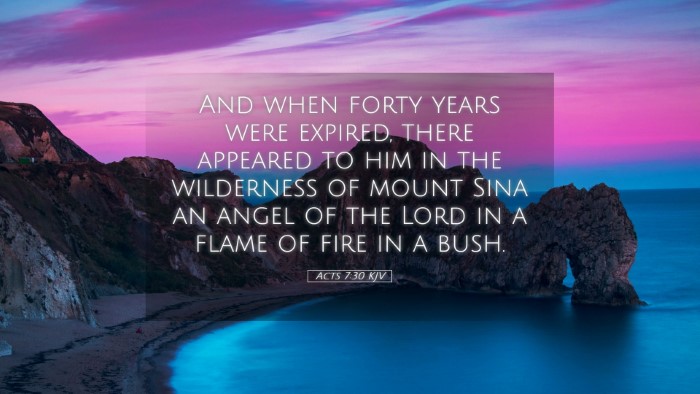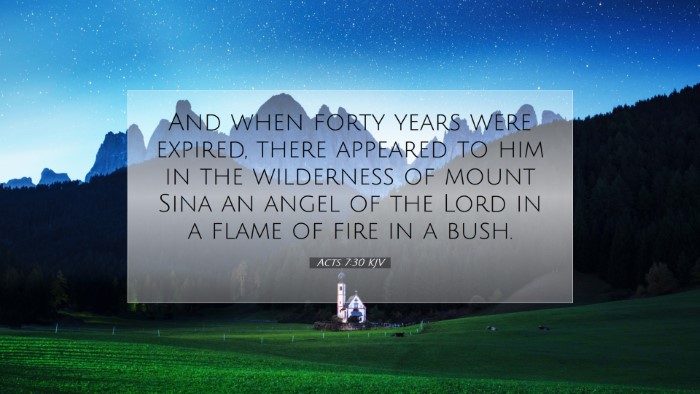Commentary on Acts 7:30
Acts 7:30 states:
"And when forty years were expired, there appeared to him in the wilderness of mount Sinai an angel of the Lord in a flame of fire in a bush."
Contextual Background
This verse is part of Stephen's defense before the Sanhedrin, recounting the history of Israel. Stephen, one of the first deacons of the Church, emphasizes the pivotal moment in Moses' life when he encountered God. This account serves to illustrate God's providential guidance and the establishment of His covenant with Israel.
Moses in Midian
Matthew Henry highlights that Moses, having fled Egypt after killing an Egyptian, spent forty years in Midian. This period was not wasted, as it was a formative time where Moses learned humility and dependence on God. The commentary states that:
- Moses' formative years: These were critical for developing Moses’ character, away from the false comforts of Egyptian royalty.
- Divine preparation: God prepared Moses for his future mission, indicating that God often prepares His servants through prolonged periods of obscurity.
The Divine Encounter
When the time was fulfilled, God initiated a remarkable revelation in the burning bush on Mount Sinai. Albert Barnes notes that the significance of the angel appearing in flames conveys both God’s holiness and His presence:
- The holiness of God: The flame represents God's purifying presence, emphasizing that God is both transcendent and imminent.
- Illustration of theophany: This incident exemplifies God's communication with His people, often through extraordinary means, to convey His will.
The Significance of Forty Years
The passage explicitly mentions the duration of "forty years," a significant number in biblical literature, representing periods of testing and preparation:
- Symbolism of forty: Adam Clarke states that periods of forty days or years in scripture often denote a time of trial, testing, or preparation, as seen in the wilderness wanderings of Israel.
- Moses' readiness: This forty-year period in Midian was essential for Moses to mature into the leader God intended him to be, equipping him to confront Pharaoh and lead the Israelites to freedom.
God’s Sovereignty and Timing
This verse provides profound insights into God’s sovereignty and divine timing. God orchestrated events such that Moses would encounter Him when he was both prepared and in need:
- Divine appointment: Just as God had a specific time for Moses, so too, He has designated moments for each of His servants throughout history.
- Encouragement for believers: The timing of God is perfect. For those in ministry or facing trials, this example assures them that God's preparations are often unseen but purposeful.
The Call to Leadership
The appearance of the angel and the call to Moses in this dramatic setting foreshadows his critical role in redemptive history. Stephen's recounting serves to remind us of the call to leadership and the responsibility that accompanies it:
- Leadership through encounter: Leaders are shaped by their encounters with God. Moses' transformation from shepherd to leader illustrates the significance of divine calling.
- Courage and conviction: Calling entails both challenges and opportunities to display faith and reliance on God, as exemplified in Moses’ subsequent actions.
Implications for Ministry
For pastors, students, and theologians, Acts 7:30 holds critical implications:
- Understanding one's calling: There is a need for discernment regarding God’s voice and call in one’s life.
- Growth in obscurity: The waiting period may feel like stagnation, but it can be a time of spiritual growth and preparation.
- Faithfulness in the mundane: Faithfulness in daily responsibilities can lead to divine appointments.
Conclusion
Acts 7:30 reminds believers of the powerful ways in which God worked through Moses, appearing to him at a crucial moment. The symbolism of the burning bush, Moses’ forty years in Midian, and the divine calling all converge to provide profound lessons on leadership, divine timing, and the transformative power of an encounter with God. For the pastor, student, and theologian, this verse serves as a foundation to explore God’s work throughout history and in individual lives today.


